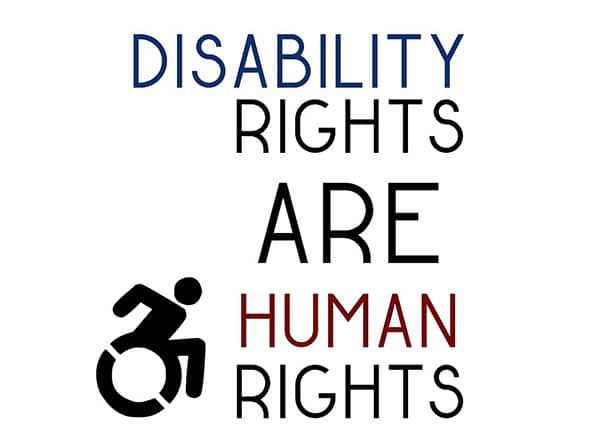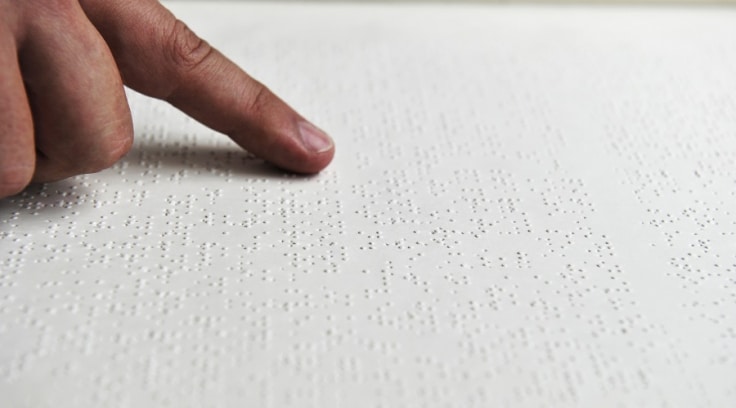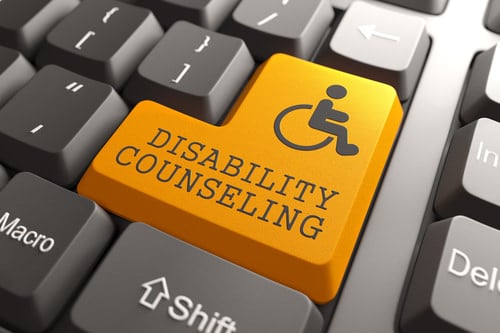#Society
Accommodations For People With Disabilities At Mosques
Published

Mosques are places of worship to perform Salah (prayer), learn about Islam, and grow. It is a place for Muslims to find a sense of belonging and community. This right also extends to people with disabilities and their caretakers. People with disabilities are, however, at the risk of facing both physical and attitudinal barriers within the overall community. This may also extend at places of worship—including mosques—in that there is the risk of people with disabilities not having their spiritual needs addressed. There are long-term implications to one’s wellbeing whenever any form of basic human need is not met. It is then vital to have accommodation at venues, especially at places of worship, as a priority.
It is hard for the overall community to grow when some community members are absent due to a lack of accommodation. Accommodation towards people with disabilities is integral for the community’s overall growth, because disability is part of the human experience that allows one to face and learn about life’s reality. Places of worship are usually the breeding ground for learning about life’s realities and navigating through life. Lack of accommodation at places of worship is thus a paradox. Disability is also a reality that one would most likely face, whether due to old age, or family members later acquiring a disability. As a result, communal support through accommodation is a general need, especially at places of worship.
One may acquire a temporary or permanent disability later on, but many still are born with a disability. Lack of accommodation can inadvertently send a message to youngsters with disabilities and chronic illnesses, that they do not belong. It can prevent them—as youngsters—from having a space to learn, which can ultimately deprive them of their right to utilize communal resources for growth. So, it is necessary for leaders, especially at places of worship, to know of the different types of disabilities1There are a variety of disabilities that may be visible or invisible, long-term or temporary. The common categories of disabilities include: physical, sensory, psychological, and intellectual (learning disability). Chronic illnesses & pain may also be considered a form of disability. to build an accommodating and inclusive space.
Keep supporting MuslimMatters for the sake of Allah
Alhamdulillah, we're at over 850 supporters. Help us get to 900 supporters this month. All it takes is a small gift from a reader like you to keep us going, for just $2 / month.
The Prophet (SAW) has taught us the best of deeds are those that done consistently, even if they are small. Click here to support MuslimMatters with a monthly donation of $2 per month. Set it and collect blessings from Allah (swt) for the khayr you're supporting without thinking about it.
Below are 3 possible steps towards accommodation at mosques:
1. Accommodation through introducing the rights of people with disabilities in Islam and law of the land:

The introduction of rights towards people with disabilities in Islam, and the laws of the land, can help dispel stigmatization. It can help one move towards accommodation and the right of participation. Stigmatization leads to one being ostracized and thus dehumanized. It is, therefore, necessary to firstly introduce and discuss the rights of people with disabilities arranged by the board of the mosque to its congregation. This automatically accommodates the topic of disability as part of community-based discussion, and grants a sense of belonging for people with disabilities and their families. It also sends a strong message from the mosque board that the board is trying to understand, learn, and have accommodation as a work-in-progress priority.
Disability accommodation is an integral part of Islam and is shown in Islamic history through the example of Prophet Muhammad 
Prophet Muhammad 

A companion that was blind also once asked Prophet Muhammad 


It was common for Muslims with disabilities to have assistance to attend prayer, especially if not living near the mosque. Umar Ibn Abdul Aziz 

The fact that early Muslims with disabilities participated within the community shows how disability accommodation was prioritized within Islamic history. Disability accommodation was part of the conversation as demonstrated between the companion that was blind 


The disability discrimination laws of the land today are also important to introduce—and discuss—to show how much people with disabilities belong, too. It is even more important, because of the assumption that accommodation is not meant for discussion today within Muslim spaces, due to feasibility hurdles.
The American with Disabilities Act (ADA) may not explicitly address accommodation at places of worship, but it still demonstrates the public accommodation rights for people with disabilities in the community. The Equality Act 2010 for the UK makes it obligatory for service-based venues to accommodate people with disabilities, including at places of worship. The Disability Discrimination Ordinance (DDO) for Hong Kong also spells out rights for people with disabilities and their caretakers not undergoing ‘unjustifiable hardship.’ Laws related to disability—and even building regulations—one way or another address the right of accommodation as a means to remove barriers faced.
United Nations’ Convention on the Rights of Persons with Disabilities (CRPD) also spells out the right of participation for people with disabilities, and has been signed as an international human rights treaty by many countries. The right of participation can only be properly fulfilled through accommodation. It is vital for mosque boards—and the overall Muslim community—to see participation from people with disabilities as a right through its introduction and discussion.
It is only through discussion that the Muslim congregation can see how people with disabilities and their families are meant to be part of the community, too.
2. Accommodation through establishing a disability-care board within mosques

The disability-care committee could consist of members from the community that are:
– People with disabilities
– Family members of people with disabilities and caretakers
– Health care professionals (doctors, nurses, paramedics, therapists, physiotherapists, occupational therapists, and nutritionists)
– Special Educational Needs educators and academics with a disability studies background
– Government officials with influence in making policy, and lawyers to liaise within the wider community
– Architects and contractors that have familiarity with building regulations
– Entrepreneurs or anyone with NGO fundraising/campaigning background
There is still the possibility of having a disability-care committee in scenarios where all community members are not available, as mentioned above. The primary purpose is to establish a board that would work closely with the mosque’s central board to brainstorm solutions after assessing the congregation’s needs. The disability-care board could consult within the wider community or international Muslim community if any form of guidance is lacking. Mosque boards usually have to liaise with the government or the main mosque within the city. It then helps to have a body that specializes in bringing forth the accommodation needs for people with disabilities from the congregation.
Such a board can also help promote health care within the mosque, especially during Ramadan, and the preparation of meals. However, the primary purpose of the disability-care board meetings would be to hear the disability experience and list out accessibility barriers for entering or using the building. Some of the meetings could be held at homes if it is easier for people with disabilities and their families. The board could also liaise with Muslim disability organizations such as MUHSEN, DEEN Support Services, and SMILE Canada for volunteer trainings within the community. This would guide the congregation on general awareness on how to help people with disabilities and their families at home and within the community.
Awareness training on how to help could ensure that people with disabilities have the support to attend daily iftaars and taraweeh prayers during Ramadan. This may consist of renting accessible vehicles that are part of government facilities for people with disabilities. Awareness training is especially good for our youth, so that there would be familiarity around disability, and proper integration between our youth with disabilities. It would also allow caretakers to have support whenever taking breaks or catering towards the needs of siblings of children with disabilities.
The function of a disability-care board within mosques is meant to promote community care in Islam through collaboration with leading Imams. It is a network and means for the mosque to be connected with the broader community and the international disability community. It is a means to show how Muslims care and can expand hospital-visiting services for our ill within the local community. The disability-care board may appear to be just on disability, but it can help improve overall management within mosques, especially advancing care towards our elderly and developing multi-sensory learning materials for the general congregation.
Accommodation is needed for everyone—our Imams that may not have disabilities need accommodation through the use of microphones, too.
A disability-care board is just a means to further support the leadership of our Imams.
3. Accommodation through inclusive language and authentic disability representation

The best way to ensure inclusive language is to hear from people with disabilities regarding their experiences directly. Accept their authentic experience as it is because that is the strongest message of accommodation. People with disabilities are sometimes gaslit whenever they voice on the physical and attitudinal barriers faced. The experiences of people with disabilities, therefore, need to be accommodated in order to learn for the overall growth of our community.
It is the overall duty of our Ummah to hear, learn, understand, and most importantly accept people with disabilities as part of our community.
Acceptance is the getaway to accommodation.
Acceptance is the start and key.
Related reading:
– The Missing Muslims: Living With Disability
– Disability & Social Justice: In Conversation With Sa’diyya Nesar And Zeba Khan
Disability & Social Justice: In Conversation With Sa’diyya Nesar And Zeba Khan
Keep supporting MuslimMatters for the sake of Allah
Alhamdulillah, we're at over 850 supporters. Help us get to 900 supporters this month. All it takes is a small gift from a reader like you to keep us going, for just $2 / month.
The Prophet (SAW) has taught us the best of deeds are those that done consistently, even if they are small. Click here to support MuslimMatters with a monthly donation of $2 per month. Set it and collect blessings from Allah (swt) for the khayr you're supporting without thinking about it.
Sa’diyya Nesar is the author of 'Strength from Within,' TEDx speaker, and poet that lives life with a physical disability. Download chapter 1 of her book here: www.sadiyyanesar.com


Cultivating A Lifelong Habit Of Dua In Children

When to Walk Away from Toxic Friends | Night 9 with the Qur’an

My First Ramadan As A Convert: The Lengths Small Acts of Kindness Can Go

What Islam Actually Says About NonMuslim Friends | Night 8 with the Qur’an

Ramadan, Disability, And Emergency Preparedness: How The Month Of Mercy Can Prepare Us Before Communal Calamity

30 Nights with the Qur’an: A Ramadan Series for Muslim Teens

How to Make this Ramadan Epic | Shaykh Muhammad Alshareef

[Podcast] Guardians of the Tradition: Muslim Women & Islamic Education | Anse Tamara Gray

Who Am I Really? What Surat Al-‘Asr Teaches Muslim Teens About Identity | Night 1 with the Qur’an

Starting Shaban, Train Yourself To Head Into Ramadan Without Malice

When to Walk Away from Toxic Friends | Night 9 with the Qur’an

What Islam Actually Says About NonMuslim Friends | Night 8 with the Qur’an

Week 1 in Review: Is Your Teen Actually Changing? | Night 7 with the Qur’an

Why Your Teen Wants to Change Their Muslim Name | Night 6 with the Qur’an

The Comparison Trap | Night 5 with the Qur’an
Trending
-
#Islam1 week ago
30 Nights with the Qur’an: A Ramadan Series for Muslim Teens
-
#Current Affairs1 month ago
[Podcast] Should Muslims Ally with Conservatives or Progressives? | Imam Dawud Walid
-
#Islam4 weeks ago
How to Make this Ramadan Epic | Shaykh Muhammad Alshareef
-
#Life1 month ago
[Podcast] The Parts of Being an Imam They Don’t Warn You About | Sh Mohammad Elshinawy








